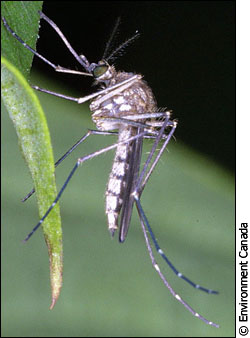|
The promise of mutant insects
By
Carolyn Duncan
OTTAWA —
Insects in general are a hot
topic for research – they may hold the key to
disease control in tropical countries, crop successes
or failures along with many other possibilities.
Genetically modified organisms
are nothing new on the biotechnology front. The range
of living things that could be changed through genetic
modification is constantly growing.
 |
| Mosquitoes are insect vectors
for malaria. |
Dr. Thomas Miller at University
of California Riverside Campus works
with the pink bollworm, an insect known for its devastating
damage to the U.S. cotton industry. It is present in
many countries around the world.
Miller works to eradicate the bollworm
through genetic modification. He is able to practise
more than one method of genetically altering it. He
can make it sterile using radiation, or can insert a
gene that will make it die with more ease in natural
environments.
Dr. Carl Lowenberger at Simon Fraser
University in Vancouver works with mosquitoes to eventually
try and eradicate malaria. He is trying to make the
malaria parasite die while it is in a mosquito so that
it will not infect humans. However, this method would
require a lot more testing and paperwork due to the
effect these genetically altered mosquitoes might have
on a natural environment.
Dr. David O’Brochta at the
University of Maryland also works with mosquitoes. He
realizes that genetic modification of organisms is a
very powerful tool. He suggests a major ethical concern
surrounds GM insects — once a strong modified
insect is released into the wild, there is no way to
get it back.
“It’s not going to
be a matter of just opening the window and letting them
go…” he said.
Full Story »
|